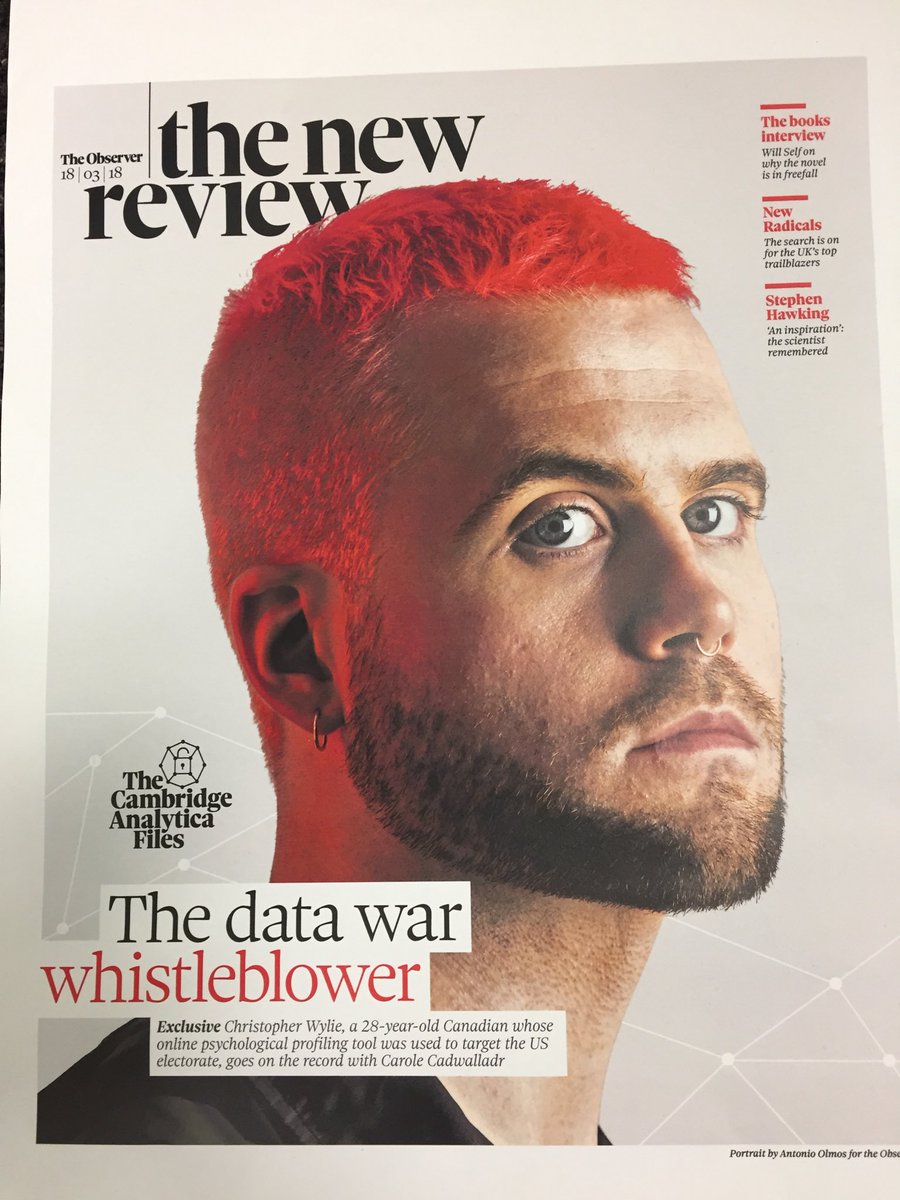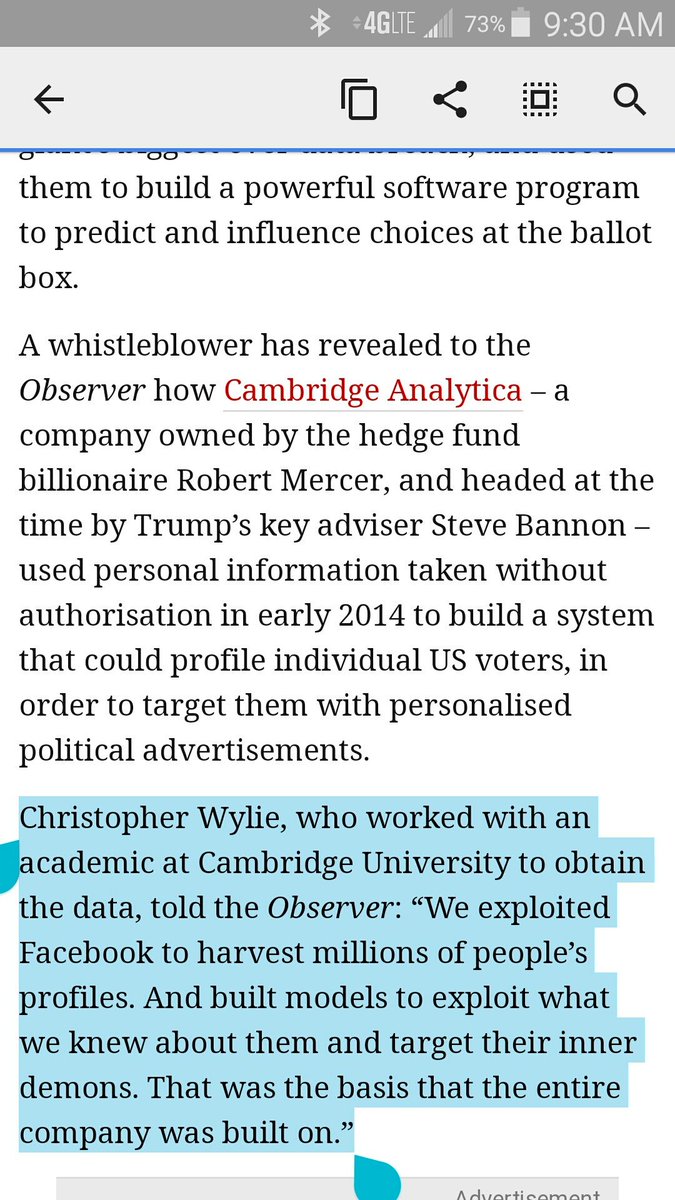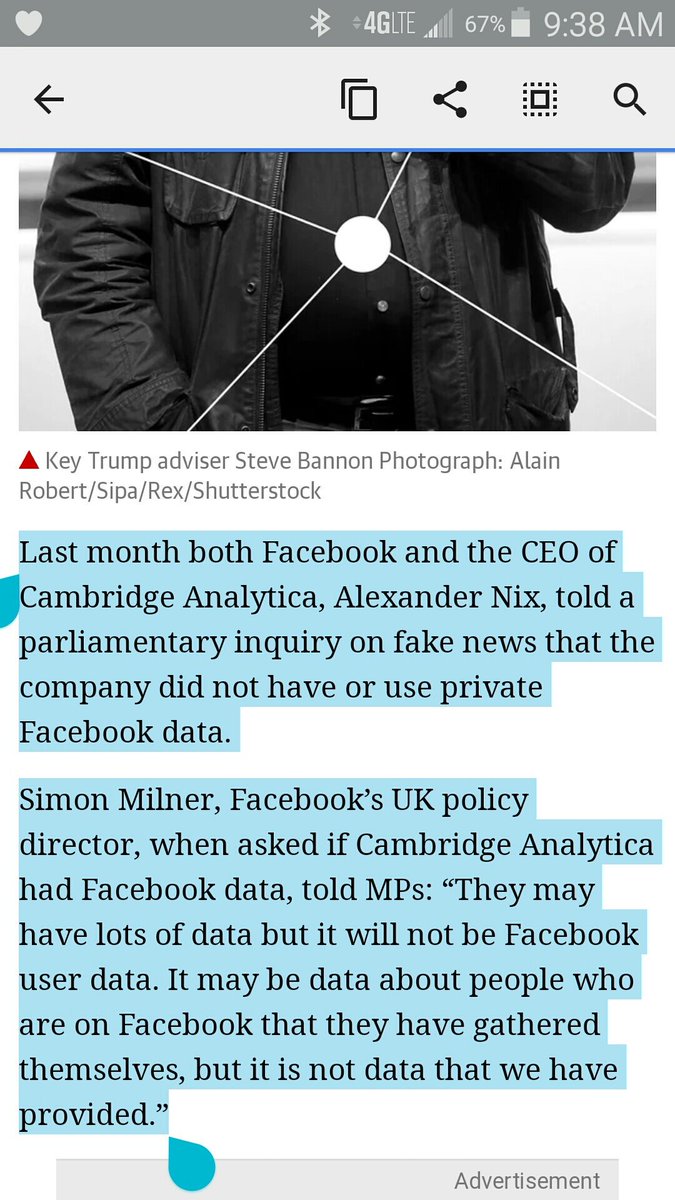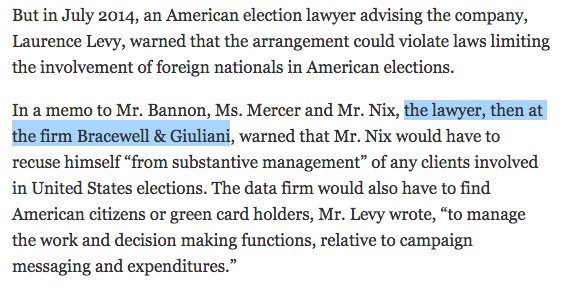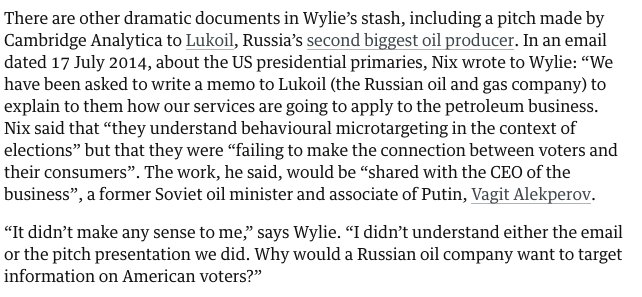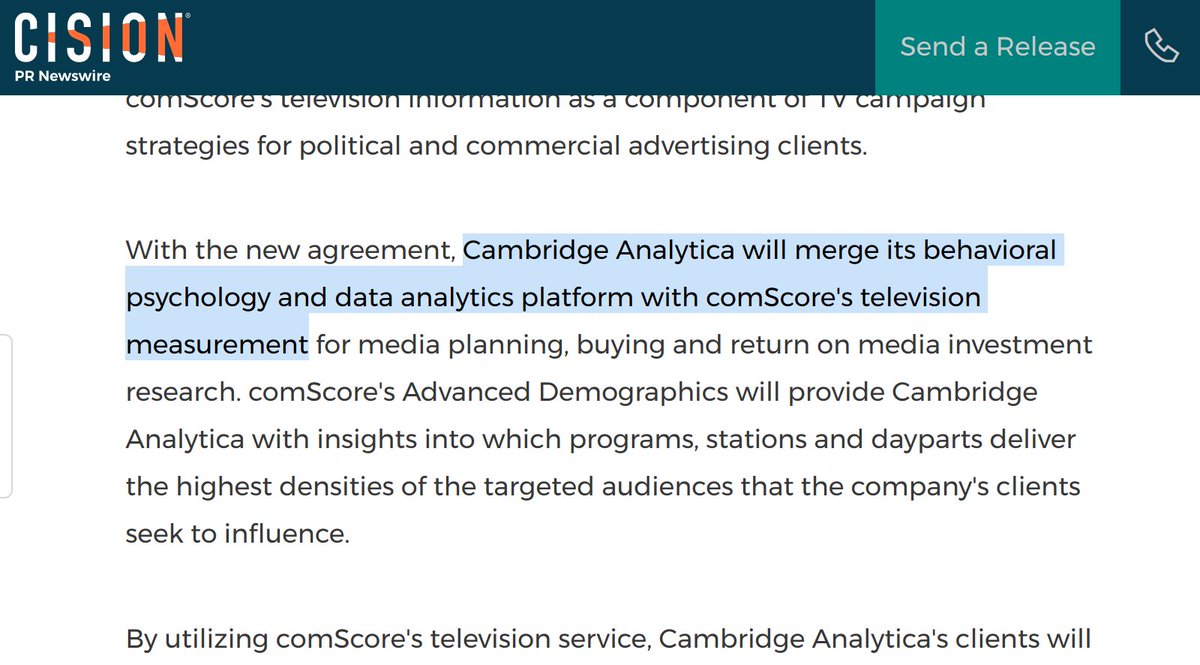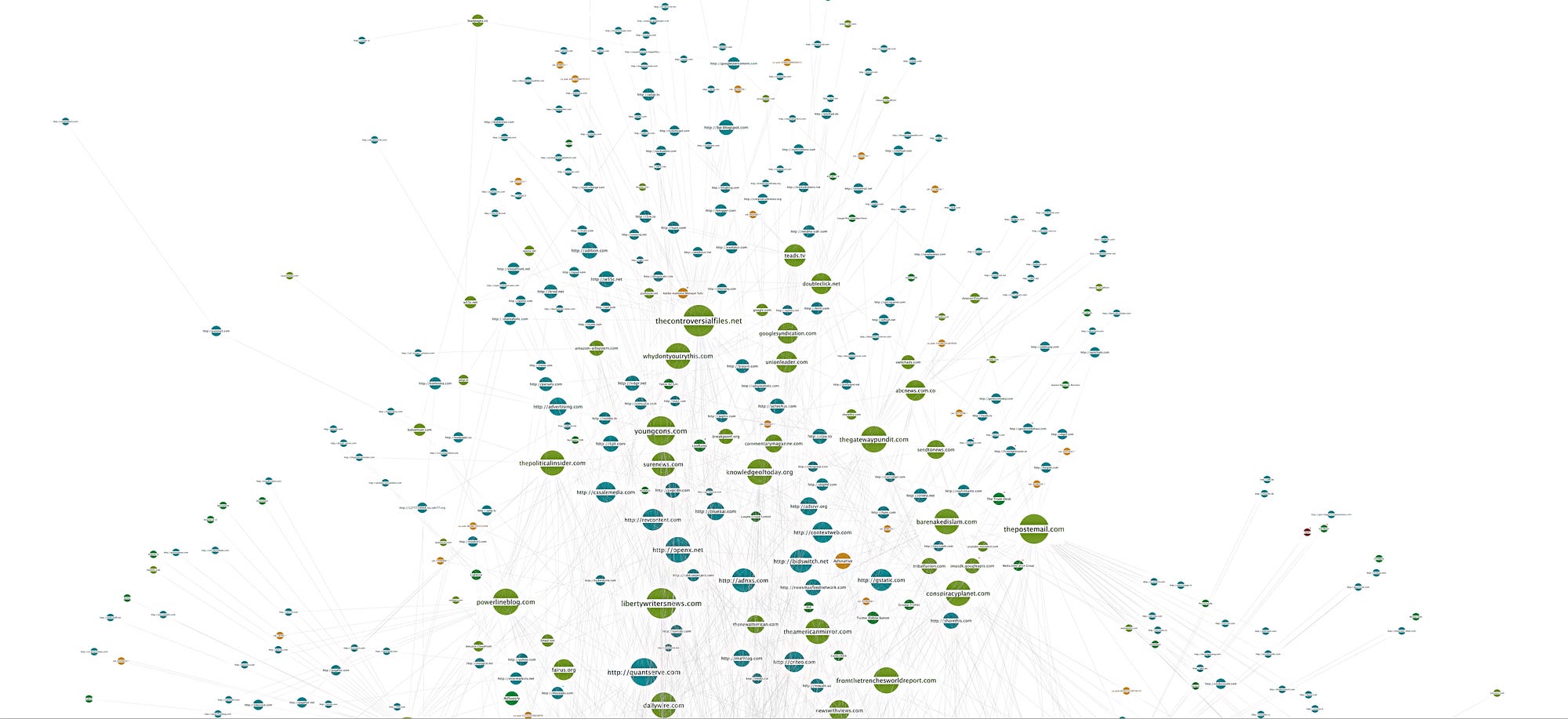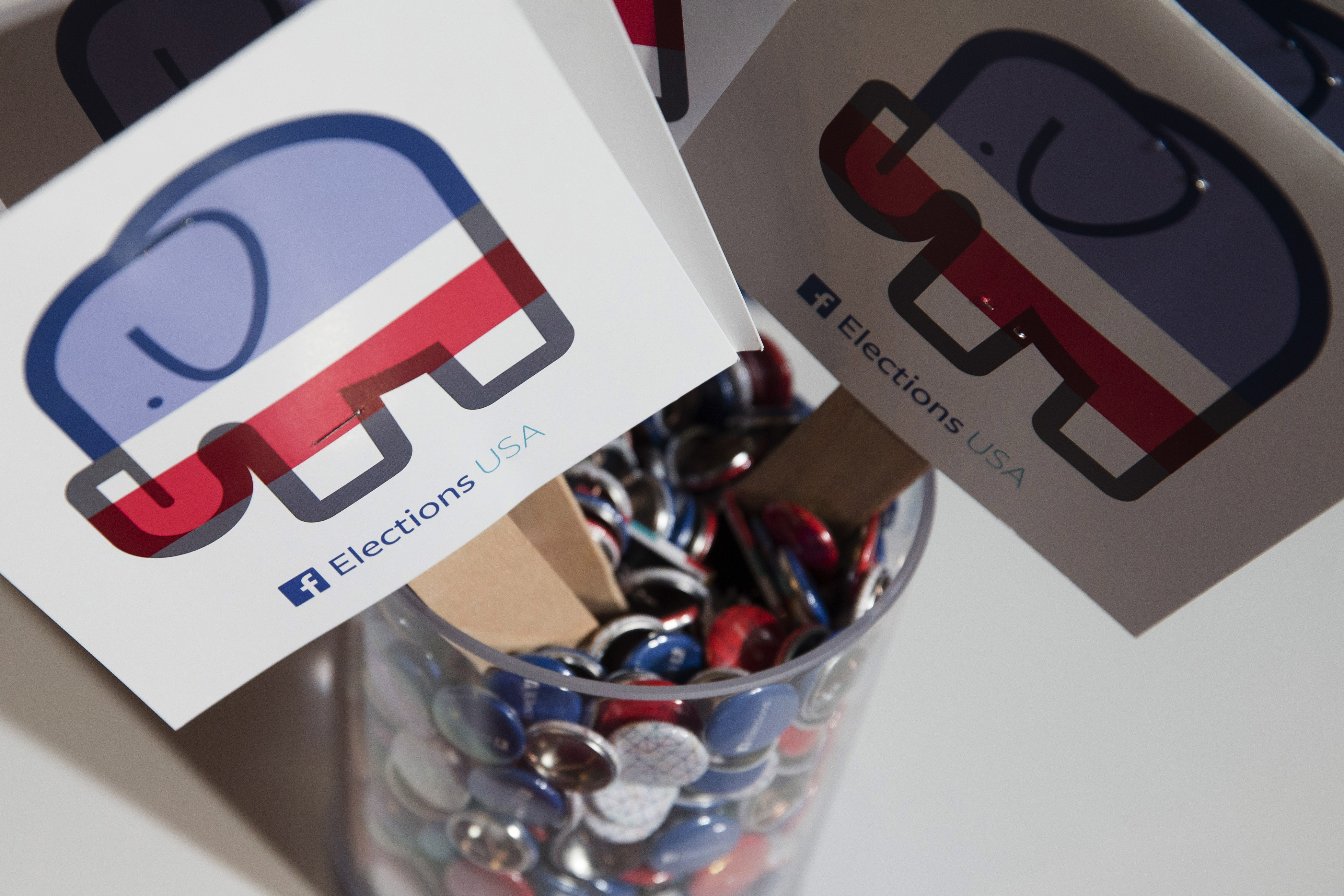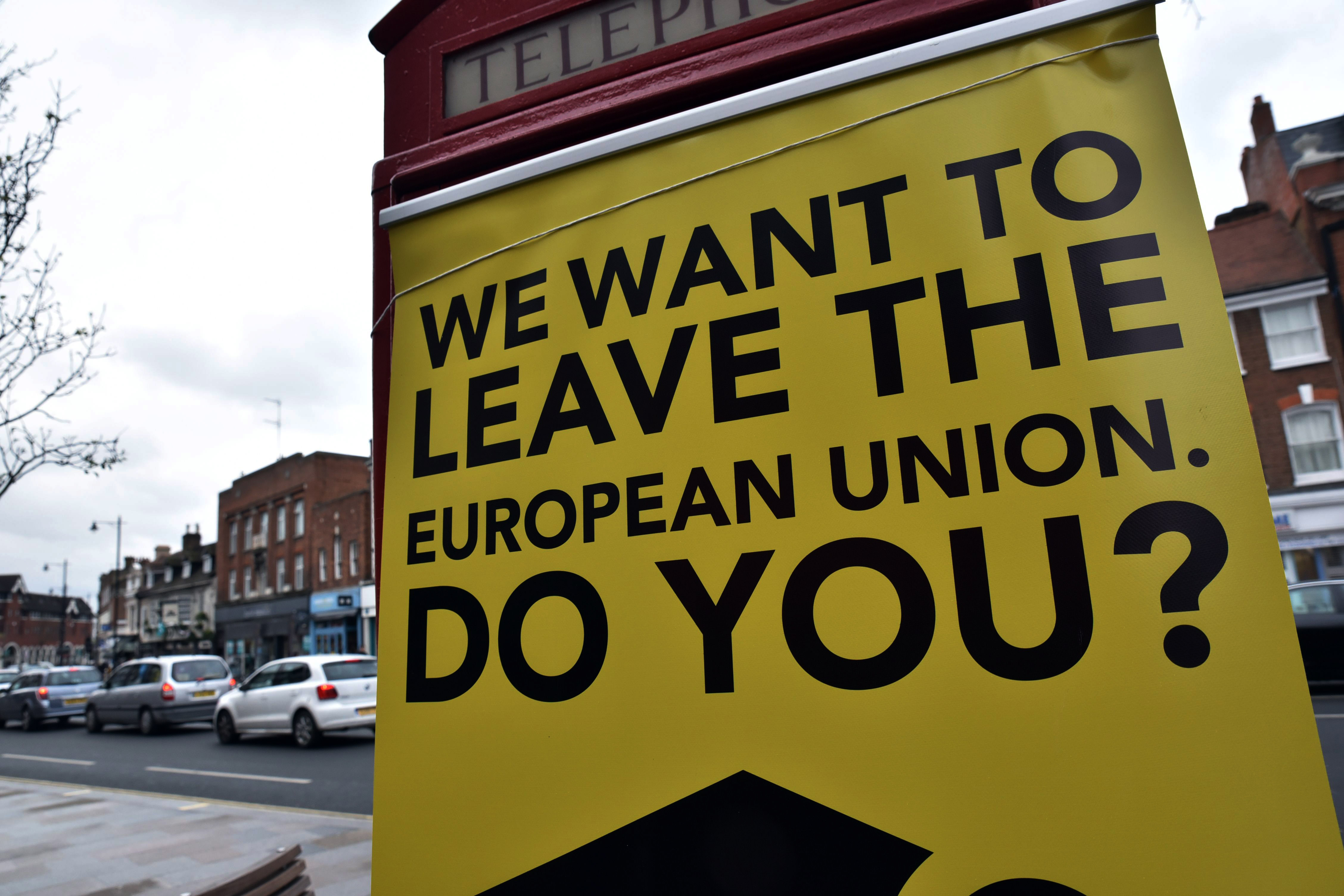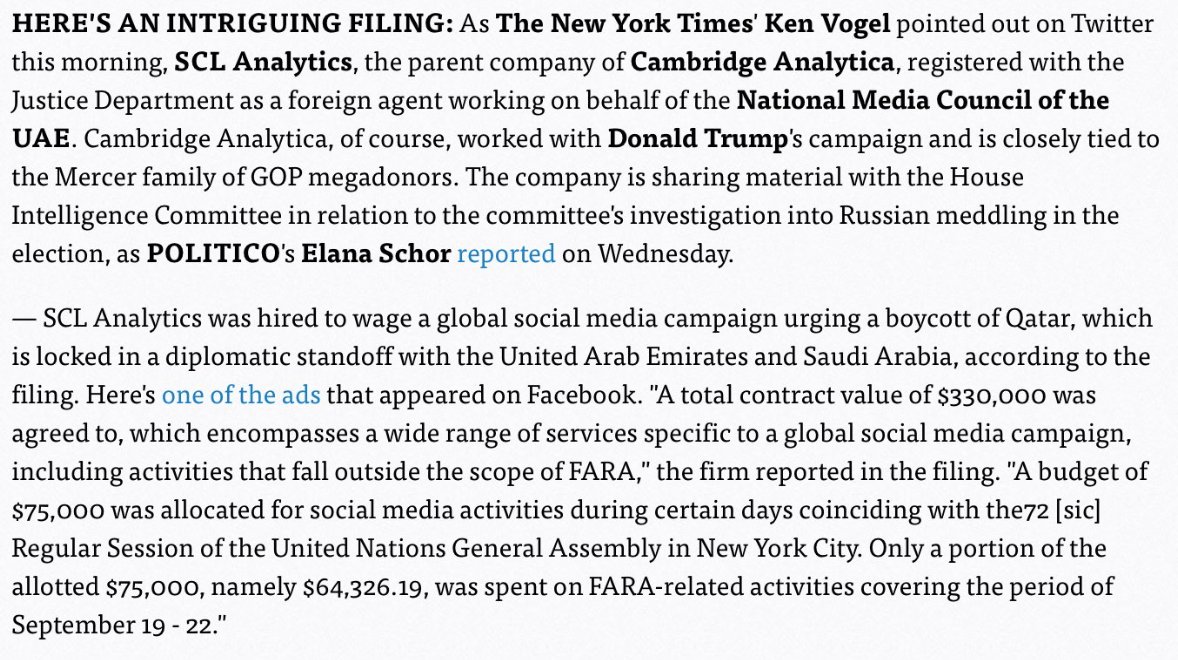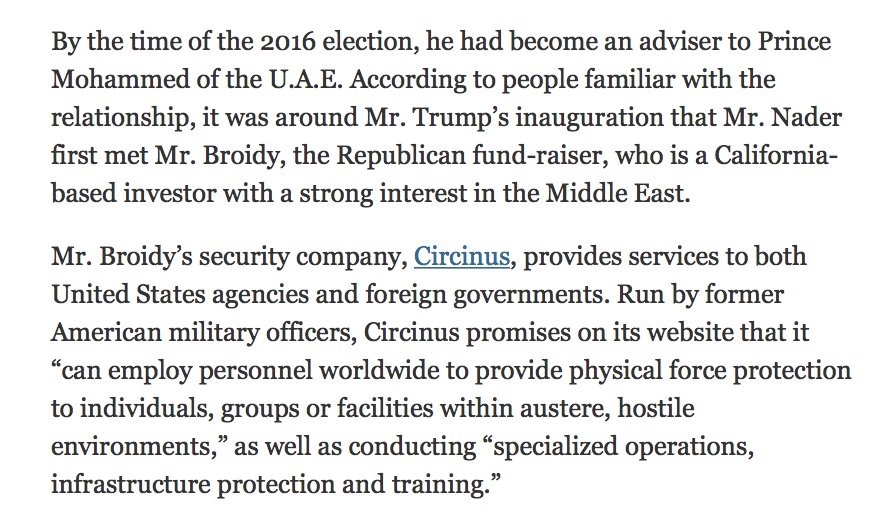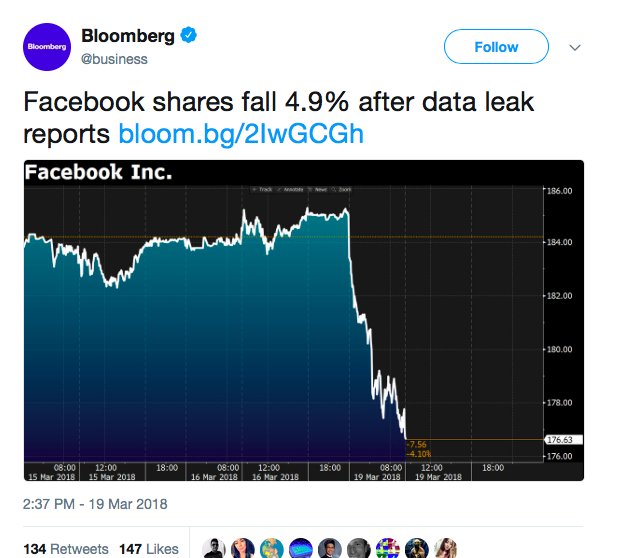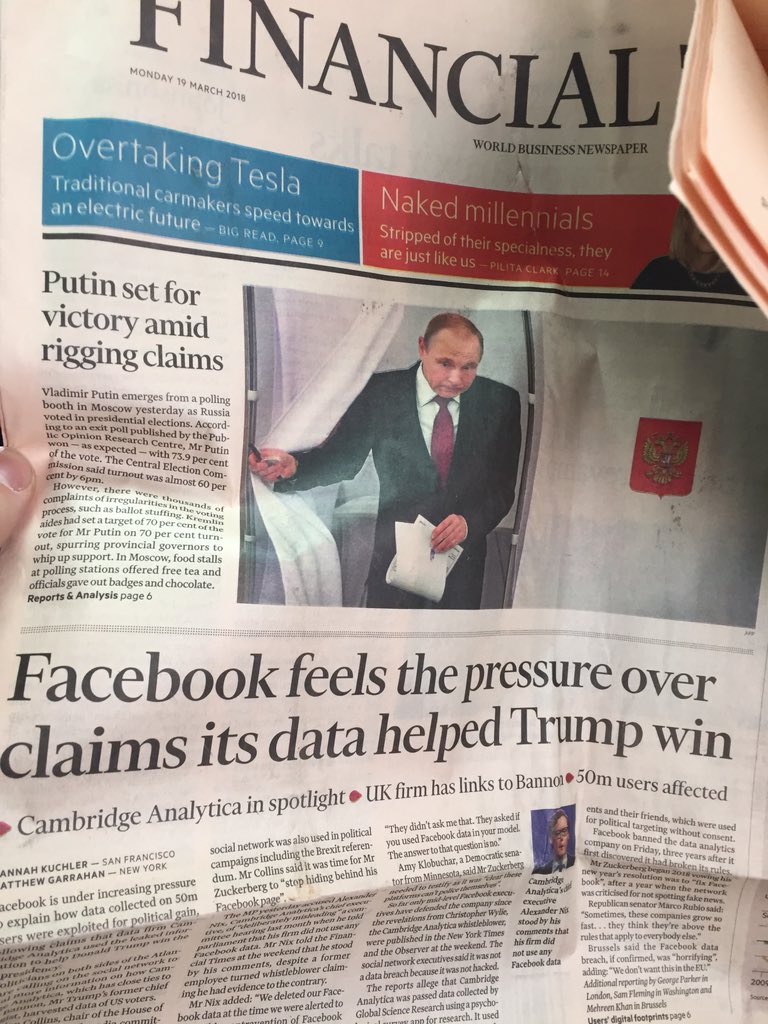Revealed: Trump’s election consultants filmed saying they use bribes and sex workers to entrap politicians
An undercover investigation by Channel 4 News reveals how Cambridge Analytica secretly campaigns in elections across the world. Bosses were filmed talking about using bribes, ex-spies, fake IDs and sex workers.
https://www.youtube.com/watch?v=mpbeOCKZFfQ
Senior executives at Cambridge Analytica – the data company that credits itself with Donald Trump’s presidential victory – have been secretly filmed saying they could entrap politicians in compromising situations with bribes and Ukrainian sex workers.
In an undercover investigation by Channel 4 News, the company’s chief executive Alexander Nix said the British firm secretly campaigns in elections across the world. This includes operating through a web of shadowy front companies, or by using sub-contractors.
In one exchange, when asked about digging up material on political opponents, Mr Nix said they could “send some girls around to the candidate’s house”, adding that Ukrainian girls “are very beautiful, I find that works very well”.
In another he said: “We’ll offer a large amount of money to the candidate, to finance his campaign in exchange for land for instance, we’ll have the whole thing recorded, we’ll blank out the face of our guy and we post it on the Internet.”
Offering bribes to public officials is an offence under both the UK Bribery Act and the US Foreign Corrupt Practices Act. Cambridge Analytica operates in the UK and is registered in the United States.
The admissions were filmed at a series of meetings at London hotels over four months, between November 2017 and January 2018. An undercover reporter for Channel 4 News posed as a fixer for a wealthy client hoping to get candidates elected in Sri Lanka.
Mr Nix told our reporter: “…we’re used to operating through different vehicles, in the shadows, and I look forward to building a very long-term and secretive relationship with you.”
Along with Mr Nix, the meetings also included Mark Turnbull, the managing director of CA Political Global, and the company’s chief data officer, Dr Alex Tayler.
Mr Turnbull described how, having obtained damaging material on opponents, Cambridge Analytica can discreetly push it onto social media and the internet.
He said: “… we just put information into the bloodstream of the internet, and then, and then watch it grow, give it a little push every now and again… like a remote control. It has to happen without anyone thinking, ‘that’s propaganda’, because the moment you think ‘that’s propaganda’, the next question is, ‘who’s put that out?’.”
Mr Nix also said: “…Many of our clients don’t want to be seen to be working with a foreign company… so often we set up, if we are working then we can set up fake IDs and websites, we can be students doing research projects attached to a university, we can be tourists, there’s so many options we can look at. I have lots of experience in this.”
In the meetings, the executives boasted that Cambridge Analytica and its parent company Strategic Communications Laboratories (SCL) had worked in more than two hundred elections across the world, including Nigeria, Kenya, the Czech Republic, India and Argentina.
The company is at the centre of a scandal over its role in the harvesting of more than 50 million Facebook profiles.
Chief executive Mr Nix has also been accused of misleading a parliamentary select committee, which is now asking him to provide further information. He has denied the allegations.
Tonight, a Cambridge Analytica spokesman said: “We entirely refute any allegation that Cambridge Analytica or any of its affiliates use entrapment, bribes, or so-called “honey-traps” for any purpose whatsoever… We routinely undertake conversations with prospective clients to try to tease out any unethical or illegal intentions…”
They said: “Cambridge Analytica does not use untrue material for any purpose.”
And they insisted that opposition research and intelligence gathering, the use of subcontractors and working discreetly with clients are all common practice and legitimate.
https://www.channel4.com/news/cambridge ... estigation
Part 1
Whistleblower reveals to Channel 4 News data grab of 50 million Facebook profiles by Cambridge Analytica – data firm linked to Trump win
Andy Davies
Home Affairs Correspondent
The British data firm described as “pivotal” in Donald Trump’s presidential victory was behind a ‘data grab’ of more than 50 million Facebook profiles, a whistleblower has revealed to Channel 4 News.
In part one of Channel 4 News’ ‘Data, Democracy and Dirty Tricks’ investigation, in an exclusive television interview, Chris Wylie, former Research Director at Cambridge Analytica tells all.
In collaboration with the Observer newspaper.
https://www.channel4.com/news/cambridge ... e-election
Channel 4 News
Verified account
@Channel4News
Follow Follow @Channel4News
More
Tomorrow, we'll take you inside the world of Cambridge Analytica after our reporters went undercover as prospective clients.
The full story tomorrow night at 19:00 GMT - on Channel 4 News.
The Trump Campaign paid Cambridge Analytica $6 million for a database of 220 million U.S. voters including private details of their personality and activities.
BREAKING: So the Cambridge Analytica Whistleblower has been 'depersonned' by @facebook without any chance to retrieve his contacts or private materials.Christopher Wylie
@chrisinsilico
Follow Follow @chrisinsilico
More
Suspended by @facebook. For blowing the whistle. On something they have known privately for 2 years.Follow-Up Questions For Facebook, Cambridge Analytica and Trump Campaign on Massive Breach
by Justin Hendrix
March 17, 2018
Late on Friday night, Facebook made a surprising announcement. The company said it was suspending the British firm Strategic Communication Laboratories (SCL), and its political data analytics firm, Cambridge Analytica. In 2016, Cambridge Analytica famously played a role in microtargeting messages for Donald Trump’s presidential election, using Facebook data in its models. According to bombshell reports in the New York Times and the Observer this morning, it appears that the firm stole the user information it acquired from Facebook.
A whistleblower—a former Cambridge Analytica employee—presented a dossier of evidence to reporters that, according to the Observer, “includes emails, invoices, contracts and bank transfers that reveal more than 50 million profiles – mostly belonging to registered US voters – were harvested from the site in the largest ever breach of Facebook data.” The story is surprising on a number of levels. It suggests that Alexander Nix, the CEO of Cambridge Analytica, intentionally made misrepresentations in recent testimony to the British Parliament. It implicates the hedge fund billionaire Robert Mercer and his daughter, Rebekah, who together played a major role in the Trump campaign. But more than anything, it calls into question Facebook’s handling of what is clearly a massive breach of user privacy.
Journalists, regulatory bodies and Congress should be ready to ask a number of pressing questions to get to the bottom of exactly what happened. The answers are important- governments around the world are considering how best to regulate technology companies, and this extraordinary incident gets to the heart of the relationship between personal data, microtargeting, dark money and the impact of their combination with unaccountable platforms on the health of democracies.
Here are seven key questions:
1. Why did Facebook take more than two years to inform the public of this massive breach?
News reports suggest the company knew of the breach in 2015. The Intercept published allegations that more than 30 million users were affected in March 2017. Further, as Daily Beast reporter Spencer Ackerman put it on Twitter, “Zero acknowledgement from Facebook throughout 2016 & 2017 that anything was untoward about its relationship with the Trump campaign, despite reportedly knowing in August 2016 that Trump-camp partner Cambridge Analytica possessed tens of millions of illicitly acquired profiles.” When confronted with proof of the breach, the New York Times says “Facebook downplayed the scope of the leak and questioned whether any of the data still remained out of its control.” Why did the company behave this way?
2. Did the Trump campaign or Cambridge Analytica violate campaign finance laws?
The New York Times report states that “whether the [SCL’s] American ventures violated election laws would depend on foreign employees’ roles in each campaign, and on whether their work counted as strategic advice under Federal Election Commission rules.” Bizarrely, Cambridge Analytica told the Times that Nix never had any strategic role in the Trump campaign, despite mountains of evidence he led the company’s efforts. There is plenty of video of him discussing what Cambridge Analytica did for Donald Trump. It beggars belief that he would claim otherwise. Did Cambridge Analytica sell its services to the Trump campaign for fair market value or, by contrast, was it employing its data in its own direct-voter-contact advertising, for example, on behalf of the Mercers? The latter would trigger federal election laws that restrict the participation of foreign nationals in certain kinds of decision-making.
3. Did Trump campaign or Cambridge Analytica employees lie to Congress, or to the British Parliament?
Steve Bannon served on the board of Cambridge Analytica. Jared Kushner and Brad Parscale have each been credited with playing a role in the campaign’s data strategy–and Kushner boasted of his direct involvement and work with Cambridge Analytica. What did they know about Cambridge Analytica’s methodology, and were they at any point aware that the firm was trading on stolen data? Was Bannon, Kushner, and Parscale’s testimony to Congress accurate?
Further, did Alexander Nix lie to Congress or the British Parliament? The New York Times reports, as one example, that “while Mr. Nix has told lawmakers that the company does not have Facebook data, a former employee said that he had recently seen hundreds of gigabytes on Cambridge servers, and that the files were not encrypted.” Will members of Congress raise concerns if they were misled? Will British political representatives be willing to consider whether Nix’s testimony constituted contempt of Parliament?
4. Did Facebook’s failure to disclose this breach to the public and notify its directly affected consumers break any laws?
According to the National Conference of State Legislatures, 48 states have laws regarding notification in the event of breaches. Did Facebook fail to satisfy any of these laws, or any federal statute? The company has had the opportunity to disclose the breach several times, including ahead of and during testimony to lawmakers last year. Facebook says that it is “completely false” to say this involved a “data breach,” but is the company so certain that personal information was not part of the breach? Importantly, did the breach involve personal information of third parties (such as friends of the users who directly interacted with the app)? And is the company claiming the breach does not involve stolen sensitive information using some unusual definition of the word “stolen”? The Attorney General of Massachusetts has already announced that she will launch an investigation.
5. Did any of the Facebook embeds in the Trump campaign know that stolen data was being used for targeting?
A study last year in the journal Political Communication detailed the extent to which Facebook, like other technology companies, went well beyond “promoting their services and facilitating digital advertising buys” to “actively shaping campaign communication through their close collaboration with political staffers.” A 60 Minutes profile of Trump campaign digital director Brad Parscale focused on how Facebook embedded employees to help the campaign use its platform. Did any of these embedded Facebook employees know that the campaign was using stolen Facebook data in its models?
6. Did Facebook have evidence its own employees mishandled this situation? Was any disciplinary action taken?
These events unfolded over the course of years, and while the company is adamant that it has taken steps to ensure its policies are enforced, it raises the question: was anyone at any level of the company disciplined over a breach that saw information about 50 million Americans used for political purposes without their permission? What specifically has the company done to change its policies, access to its data and internal security training to ensure nothing like this can happen again?
7. Did other organizations or individuals exploit these apparent weaknesses, and are there other breaches we do not know about?
Given the number of times that Facebook has said things that turned out to be incomplete or false–such as the ever-expanding disclosure of the number of Americans affected by the Russian disinformation campaign in the 2016 election–why should we believe that this is the only breach of this kind that occurred? It is impossible to know how much Facebook user data has been sold, traded or is just sitting on various third party servers. Think of all the old Facebook games and apps, or any other third party use of Facebook user authentication. It is hard to imagine this is the only incident. How can the company and its senior leadership maintain public trust, and why do they deserve it?
***
News of the Facebook data breach broke hours just after Cambridge Analytica was served with papers in a lawsuit by an American professor, David Carroll, who is seeking more information about how his data was handled via mechanisms available to users to ask such questions under British law. In the United States, there are no similar rules. It is time to seriously question how best to regulate technology companies to give citizens and governments the means to defend themselves from such breaches, and to better understand how data, dark money and politics combine to influence citizens and undermine democracy.
Journalists, regulators, and lawmakers should start asking tough questions. Senator Mark Warner of Virginia, the ranking member of the Senate Intelligence Committee, has asked the CEOs of the technology companies to testify before the 2018 midterm elections. Will it be too late?
https://www.justsecurity.org/54045/foll ... ve-breach/Cambridge Analytica: links to Moscow oil firm and St Petersburg university
Emma Graham-Harrison Sat 17 Mar 2018 17.59 EDT
Data company gave briefing to Moscow firm Lukoil, and the lecturer who developed the crucial algorithm worked for St Petersburg university
The Twelve colleges building of St Petersburg university Russia
St Petersburg State University, where Aleksandr Kogan taught and received research grants. Photograph: Alamy
Aleksandr Kogan, the Cambridge University academic who orchestrated the harvesting of Facebook data, had previously unreported ties to a Russian university, including a teaching position and grants for research into the social media network, the Observer has discovered. Cambridge Analytica, the data firm he worked with – which funded the project to turn tens of millions of Facebook profiles into a unique political weapon – also attracted interest from a key Russian firm with links to the Kremlin.
Energy firm Lukoil, which is now on the US sanctions list and has been used as a vehicle of government influence, saw a presentation on the firm’s work in 2014. It began with a focus on voter suppression in Nigeria, and Cambridge Analytica also discussed “micro-targeting” individuals on social media during elections.
The revelations come at a time of intense US scrutiny of Russian meddling in the 2016 US presidential election, with 13 Russians criminally charged last month with interfering to help Donald Trump.
In Britain, concerns about Russian propaganda have been mounting, with the prime minister, Theresa May, recently attacking Russia for spreading fake news, accusing Moscow of attempts to “weaponise information” and influence polls.
Lukoil, Russia’s second-largest oil company, discussed with Cambridge Analytica the data company’s powerful social media marketing system, which was already being deployed for Republican Ted Cruz in the US presidential primaries and was later used to back Brexit and Trump.
Alexander Nix, chief executive of Cambridge Analytica, emailed colleagues after initial contacts to say that Lukoil wanted a clearer explanation of “how our services are going to apply to the petroleum business”.
“They understand behavioural micro-targeting in the context of elections (as per your excellent document/white paper) but they are failing to make the connection between voters and their consumers,” he wrote in an email seen by the Observer.
A slide presentation prepared for the Lukoil pitch focuses first on election disruption strategies used by Cambridge Analytica’s parent company, SCL, in Nigeria. They are presented under the heading “Election: Inoculation”, a military term used in “psychological operations” and disinformation campaigns. Other SCL documents show that the material shared with Lukoil included posters and videos apparently aimed at alarming or demoralising voters, including warnings of violence and fraud.
Discussion of services offered by Cambridge Analytica was apparently going right to the top of Lukoil, even though its retail operations in America are a very minor corner of the oil and gas giant’s empire. Asking for a detailed presentation of Cambridge Analyticas’s work in July 2014, Nix told his colleague the document would be “shared with the CEO of the business”.
The chief executive of Lukoil, Vagit Alekperov, is a former Soviet oil minister who has said the strategic aims of Lukoil are closely aligned with those of Russia. “I have only one task connected with politics, to help the country and the company. I’m not close to Mr Putin, but I treat him with great respect,” he told the New York Times.
Cambridge Analytica said an affiliate company had talked to Lukoil Turkey about a loyalty card scheme and proposed a pilot study with a small number of petrol stations there, but the project had not gone ahead. “[The talks] were about potential commercial work in Turkey and did not involve any discussion of political work,” a spokesman said. “Cambridge Analytica and its affiliate companies have not worked in Russia and have not worked for a Russian company or organisation.”
Last month Nix told MPs: “We have never worked with a Russian organisation in Russia or any other company. We do no have any relationship with Russia or Russian individuals.”
That appears to contradict the company documents seen by the Observer, that list Russia as one of the countries where Cambridge Analytica and affiliate companies have clients.
Christopher Wylie, the whistleblower who has come forward to talk to the Observer, said it was never entirely clear what the Russian firm hoped to get from the operation.
“Alexander Nix’s presentation didn’t make any sense to me,” said Wylie, who left Cambridge Analytica soon after the initial meetings. “If this was a commercial deal, why were they so interested in our political targeting?”
Lukoil did not respond to requests for comments.
Kogan, a lecturer who worked with Cambridge Analytica on building up the database of US voters then at the heart of the company’s plans, said he had not had any connection to the Lukoil pitch.
But while he was helping turn Facebook profiles into a political tool he was also an associate professor at St Petersburg State University, taking Russian government grants to fund other research into social media. “Stress, health, and psychological wellbeing in social networks: cross-cultural investigation” was the title of one piece of research. Online posts showed Kogan lecturing in Russian. One talk was called: “New methods of communication as an effective political instrument”.
Cambridge University said academics are allowed to take on outside work but are expected to inform their head of institution, a rule Kogan had complied with. “We understand that Dr Kogan informed his head of department of discussions with St Petersburg University regarding a collaboration; it was understood that this work and any associated grants would be in a private capacity,” a spokesman said.
Apart from that, Kogan appears to have largely kept the work private. Colleagues said they had not heard about the post in St Petersburg. “I am very surprised by that. No one knew,” one academic who asked not to be named told the Observer. Russia is not mentioned in a 10-page CV Kogan posted on a university website in 2015. The CV lists undergraduate prizes and grants of a few thousand dollars and links to dozens of media interviews.
One Cambridge Analytica employee mentioned Kogan’s Russian work in an email to Nix in March 2014 discussing a pitch to a Caribbean nation for a security contract, including “criminal psychographic profiling via intercepts”.
“We may want to either loop in or find out a bit more about the interesting work Alex Kogan has been doing for the Russians and see how/if it applies,” the colleague wrote.
Kogan told the Observer: “Nothing I did on the Russian project was at all related to Cambridge Analytica in any way. No data or models.” His recollection was that the Russia project had started a year after his collaboration with Cambridge Analytica ended.
He said the St Petersburg position emerged by chance on a social visit. A native Russian speaker, Kogan was born in Moldova and brought up in Moscow until he was seven, when his family emigrated to the US, where he later obtained citizenship.
However, he stayed in touch with family friends in Russia and visited regularly. On one trip, he said, he “dropped an email” to the psychology department at St Petersburg.
“We met, had a nice chat, and decided let’s try to collaborate – give me more reason to visit there,” he told the Observer in an email.
https://www.theguardian.com/news/2018/m ... are_btn_twThis April 2017 thread describes how Joseph Chancellor — Alekansandr Kogan's main collaborator on the Cambridge Analytica/SCL project that harvested Facebook data from unwitting users — was later hired by Facebook.
After he helped steal your data.
... from Facebook.PSYCHOLOGICAL WARFARE
Posted on September 5, 2017 by Zev Shalev and Tracie McElroy
THE SECRET STORY OF HOW AMERICAN MINDS WERE MANIPULATED DURING THE 2016 ELECTION CAMPAIGN AND HOW DONALD TRUMP’S BACKERS ARE MAKING MONEY OFF IT.
Psychologist Michal Kosinski switched on the TV in his Zurich hotel room on the morning of November ninth. The headlines were all about Donald Trump’s against-all-odds win in the U.S. presidential election. The news filled the Polish-born academic with dread, Kosinski told Das Magazine. The 34-year-old psychologist was sure of one thing: the scientific model he had created helped elect Trump.
Kosinski is a pioneer in the field of psychometry. It’s the science of predicting behavior using a psychological profile gleamed from social media activity. There are five criteria which analysts use to define your personality called the OCEAN model.
Openness to new ideas and learning.
Conscientiousness is a measure of your reliability, promptness and organization.
Extraversion measures openness and sociability.
Agreeableness refers to your kindness, empathy and warmth.
Neuroticism measures your emotional stability and rate of negative emotions.
In a 2012 study, Kosinski and two colleagues at Cambridge University were able to predict any person’s race, political affiliations and sexual orientation by analyzing someone’s social media activity.
While at Cambridge, Kosinski met fellow researcher Aleksandr Kogan. Russian-born Kogan asked about using Kosinski’s method for election manipulation. “The whole thing began to stink,” Kosinski told German Das Magazine.
Kosinski wanted nothing to do with using his research for malevolent means and broke off contact with Kogan. Since then, Kosinski has travelled the world lecturing about the dangers of ‘big data’ manipulation warning it can “threaten the welfare, freedom, or even the lives of men.”
Kogan, who has since changed his name to Alexandr Specter, had very different plans for his colleagues’ research.
The secret story of how American minds were manipulated during the 2016 election and how Donald Trump’s backers are making money off it.
Dr. Michal Kosinski (left) met Dr. Aleksandr Spectre (middle) at Cambridge University where they both studied Psychometry. Spectre launched a research study of American voters using Facebook for the parent company of Cambridge Analytica, whose CEO is Alexander Nix (right).
After the invasion of the Ukraine, a Russian born researcher at Cambridge University began harvesting private data of 30 million U.S. Facebook users for Cambridge Analytica.
In 2014, Kogan founded “Global Science Research”, which was funded by London-based Scientific Communications Laboratory (SCL) and its subsidiary Cambridge Analytica. Kogan’s company hired 185,000 Americans to take an online survey and download a Facebook app. Once downloaded, the app gave Kogan information on 30 million unsuspecting Facebook users who were Facebook friends with the original survey-takers, according to The Intercept. Kogan has used Kosinski’s model to build an an algorithm to profile American voters.
In 2015, Kogan’s app was shut down because of complaints about privacy concerns. By then Kogan had gathered data on millions of Americans. “No one in this larger group of 30 million knew that “likes” and demographic data from their Facebook profiles were being harvested by political operatives hired to influence American voters,” according to The Intercept.
SCL has since distanced itself from the use of this data and Kogan’s GSR. “We do not do any work with Facebook likes,” Cambridge Analytica spokesman Lindsey Platts, said in a statement. The company “has no relationship with GSR,” Platts said.
The secret story of how American minds were manipulated during the 2016 election and how Donald Trump’s backers are making money off it.
Cambridge Analytica CEO Alexander Nix explains how his company can profile and target any voter in the U.S.
The Trump Campaign paid Cambridge Analytica $6 million for a database of 220 million U.S. voters including private details of their personality and activities.
In 2016, Cambridge Analytica, under the leadership of CEO Alexander Nix and vice-president Stephen Bannon helped manipulate the British electorate to vote for Brexit. The previously unknown company had achieved the unthinkable in breaking up the E.U. and then began to turn its attention to U.S. politics.
Donald Trump even tweeted on Aug 18: The secret story of how American minds were manipulated during the 2016 election and how Donald Trump’s backers are making money off it.
Every time you take one of those Facebook quizzes, you know the ones, which celebrity are you most like? Which Game of Thrones character are you? What country are you really from? You may think you’re taking an innocuous quiz, but what you’re really doing is giving a data mining firm like Cambridge Analytica, “express consent” to profile you. The company then cross-references that information with other data and creates an OCEAN profile of you which is even more accurate than a partner or family member could provide.
Donald Trump paid Cambridge Analytica $6 million for work on his 2016 campaign. The company’s data scientists were able to figure out Trump voters who were “very low in neuroticism, quite low in openness and slightly conscientious.” Once profiled, Cambridge Analytica could target their specific interests with tailor-made election messages and specific news content (real or fake) to work on their emotions, interests and regional location.
Think of it as a digital soapbox where the speaker is digitally crafted to appeal to your every fear and desire and pinpoint exactly where you live. Take for example, Donald Trump’s focus on the Opioid crisis and immigration during the 2016 election campaign. All of the messages were designed to surgically target voters with these seemingly “local” concerns in important swing states.
As Russian hackers targeted state voters rolls, Cambridge Analytica provided the Trump campaign with private voting history.
Cambridge Analytica assembled a database for the Trump campaign of 220 million voters known as Project Alamo. The data set included voter registration records, gun ownership records, credit card purchase histories, internet viewing history, car purchases and information from data-mining companies like Experian PLC, Datalogix, Epsilon and Acxiom Corporation.
Theresa Hong was a key digital officer for the Trump campaign. Hong told the BBC the data-set also included information about voting history. “Some of the attributes would be when was the last time they voted, who did they vote for.” In response to a question on how Cambridge Analytica would know all that information, Hong replied, “that’s their secret sauce.” (video above).
You’ll recall Russian hackers were able to infiltrate voters rolls in almost every state before the election. “We had to assume that they actually tried to at least rattle the doorknobs on all 50, and we just happened to find them in a few of them.” Michael Daniel, who led the Obama White House effort to secure the vote against Russian intrusions, told Time Magazine.
Add to this, a mysterious server in Trump Tower which is suspected of compiling a massive database of hacked voter information with Russia’s Alfa Bank and the DeVos family-owned Spectrum Health, and you begin to see a clearer picture of how Cambridge Analytica may have gotten all this data. Cambridge Analytica’s parent company was until recently owned by a British-Iranian businessman with ties to Putin-linked Ukrainian oligarch Dmitry Firtash who is wanted for bribery by the U.S. and was allegedly involved in a racketeering scheme with Paul Manafort.
From their digital headquarters in San Antonio, Texas, the Trump campaign placed between 70,000-175,000 different pieces of content on Facebook every day specifically targeting profiles provided from Cambridge Analytica. Trump’s digital advertising chief, Gary Coby, likened the effort to “high-frequency trading” and says Trump used Facebook “like no one else in politics has ever done.” In fact, all of Trump’s $85 million digital budget went into Facebook coffers.
Much of the targeted content that was delivered to voters was news created by Cambridge Analytica’s sister company Breitbart and Russian sponsored sites like Wikileaks, Sputnik and Russia Today. The FBI is investigating the role these news organizations played in Russia’s interference in the U.S. elections, according to McClatchy.
The secret story of how American minds were manipulated during the 2016 election campaign and how Donald Trump’s backers are making money off it.
Donald Trump’s key donor owns Cambridge Analytica, Stephen Bannon, Trump’s Former Senior Strategist was VP of CA and Michael Flynn former National Security Adviser was an advisor to the company.
Trump Administration inked a $496,000 deal with Cambridge Analytica while Michael Flynn and Stephen Bannon were still in office which presents a possible conflict of interest.
Cambridge Analytica is partly owned by New York hedge fund manager and major Trump donor Robert Mercer, according to Politico. Donald Trump’s former senior adviser Stephen Bannon was until recently the company’s vice-president and owned a stake in the company which could be worth as much as $5 Million. Trump’s former National Security Adviser Lt-Gen Michael Flynn, a compromised Russian asset, also disclosed he played an advisory role for Cambridge Analytica.
On February 17, the Trump Administration paid $496,000 upfront to Cambridge Analytica’s parent company SCL in a contract with the U.S. State Department. SCL’s role at the State Department is to “assess the impact of foreign propaganda campaigns and provide intelligence agencies with predictions and insight on emerging threats,” according to the Washington Post.
SCL is also working a deal with the Pentagon to teach them “how to conduct effective psychological operations,” says the Post. SCL has hired new staffers and opened a new office just up the street from the White House. SCL’s effort is being driven by a “former aide to now-departed national security adviser Michael Flynn, who served as an adviser to the company in the past,” says the Post.
Considering the senior roles Mercer, Bannon and Flynn held within Cambridge Analytica, the new Washington operation of SLC and the State Department deal could well indicate a conflict of interest.
More importantly, the way Cambridge Analytica gained access to some 30 million Facebook accounts without users’ consent, along with private voting records, raises serious privacy concerns.
The office of Special Counsel Robert Mueller is investigating all aspects of a possible conspiracy between Russia and the Trump campaign to sway the election. “That includes investigating the nature of any links between individuals associated with the Trump campaign and the Russian government and whether there was any coordination between the campaign and Russia’s efforts,” Former FBI Director James Comey testified before a congressional committee in March.FACEBOOK FAILED TO PROTECT 30 MILLION USERS FROM HAVING THEIR DATA HARVESTED BY TRUMP CAMPAIGN AFFILIATE
Mattathias Schwartz
March 30 2017, 1:01 p.m.
IN 2014, TRACES of an unusual survey, connected to Facebook, began appearing on internet message boards. The boards were frequented by remote freelance workers who bid on “human intelligence tasks” in an online marketplace, called Mechanical Turk, controlled by Amazon. The “turkers,” as they’re known, tend to perform work that is rote and repetitive, like flagging pornographic images or digging through search engine results for email addresses. Most jobs pay between 1 and 15 cents. “Turking makes us our rent money and helps pay off debt,” one turker told The Intercept. Another turker has called the work “voluntary slave labor.”
The task posted by “Global Science Research” appeared ordinary, at least on the surface. The company offered turkers $1 or $2 to complete an online survey. But there were a couple of additional requirements as well. First, Global Science Research was only interested in American turkers. Second, the turkers had to download a Facebook app before they could collect payment. Global Science Research said the app would “download some information about you and your network … basic demographics and likes of categories, places, famous people, etc. from you and your friends.”
“Our terms of service clearly prohibit misuse,” said a spokesperson for Amazon Web Services, by email. “When we learned of this activity back in 2015, we suspended the requester for violating our terms of service.”
Although Facebook’s early growth was driven by closed, exclusive networks at college and universities, it has gradually herded users to agree to increasingly permissive terms of service. By 2014, anything a user’s friends could see was also potentially visible to the developers of any app that they chose to download. Some of the turkers noticed that the Global Science Research app appeared to be taking advantage of Facebook’s porousness. “Someone can learn everything about you by looking at hundreds of pics, messages, friends, and likes,” warned one, writing on a message board. “More than you realize.” Others were more blasé. “I don’t put any info on FB,” one wrote. “Not even my real name … it’s backwards that people put sooo much info on Facebook, and then complain when their privacy is violated.”
In late 2015, the turkers began reporting that the Global Science Research survey had abruptly shut down. The Guardian had published a report that exposed exactly who the turkers were working for. Their data was being collected by Aleksandr Kogan, a young lecturer at Cambridge University. Kogan founded Global Science Research in 2014, after the university’s psychology department refused to allow him to use its own pool of data for commercial purposes. The data collection that Kogan undertook independent of the university was done on behalf of a military contractor called Strategic Communication Laboratories, or SCL. The company’s election division claims to use “data-driven messaging” as part of “delivering electoral success.”
SCL has a growing U.S. spin-off, called Cambridge Analytica, which was paid millions of dollars by Donald Trump’s campaign. Much of the money came from committees funded by the hedge fund billionaire Robert Mercer, who reportedly has a large stake in Cambridge Analytica. For a time, one of Cambridge Analytica’s officers was Stephen K. Bannon, Trump’s senior adviser. Months after Bannon claimed to have severed ties with the company, checks from the Trump campaign for Cambridge Analytica’s services continued to show up at one of Bannon’s addresses in Los Angeles.
“You can say Mr. Mercer declined to comment,” said Jonathan Gasthalter, a spokesperson for Robert Mercer, by email.
FaceBook Elections signs stand in the media area at Quicken Loans Arena in Cleveland, Thursday, Aug. 6, 2015, before the first Republican presidential debate. (AP Photo/John Minchillo) Facebook Elections signs in the media area at Quicken Loans Arena in Cleveland, Aug. 6, 2015, before the first Republican presidential debate of the 2016 election. Photo: John Minchillo/AP
The Intercept interviewed five individuals familiar with Kogan’s work for SCL. All declined to be identified, citing concerns about an ongoing inquiry at Cambridge and fears of possible litigation. Two sources familiar with the SCL project told The Intercept that Kogan had arranged for more than 100,000 people to complete the Facebook survey and download an app. A third source with direct knowledge of the project said that Global Science Research obtained data from 185,000 survey participants as well as their Facebook friends. The source said that this group of 185,000 was recruited through a data company, not Mechanical Turk, and that it yielded 30 million usable profiles. No one in this larger group of 30 million knew that “likes” and demographic data from their Facebook profiles were being harvested by political operatives hired to influence American voters.
Kogan declined to comment. In late 2014, he gave a talk in Singapore in which he claimed to have “a sample of 50+ million individuals about whom we have the capacity to predict virtually any trait.” Global Science Research’s public filings for 2015 show the company holding 145,111 British pounds in its bank account. Kogan has since changed his name to Spectre. Writing online, he has said that he changed his name to Spectre after getting married. “My wife and I are both scientists and quite religious, and light is a strong symbol of both,” he explained.
The purpose of Kogan’s work was to develop an algorithm for the “national profiling capacity of American citizens” as part of SCL’s work on U.S. elections, according to an internal document signed by an SCL employee describing the research.
“We do not do any work with Facebook likes,” wrote Lindsey Platts, a spokesperson for Cambridge Analytica, in an email. The company currently “has no relationship with GSR,” Platts said.
“Cambridge Analytica does not comment on specific clients or projects,” she added when asked whether the company was involved with Global Science Research’s work in 2014 and 2015.
The Guardian, which was was the first to report on Cambridge Analytica’s work on U.S. elections, in late 2015, noted that the company drew on research “spanning tens of millions of Facebook users, harvested largely without their permission.” Kogan disputed this at the time, telling The Guardian that his turker surveys had collected no more than “a couple of thousand responses” for any one client. While it is unclear how many responses Global Science Research obtained through Mechanical Turk and how many it recruited through a data company, all five of the sources interviewed by The Intercept confirmed that Kogan’s work on behalf of SCL involved collecting data from survey participants’ networks of Facebook friends, individuals who had not themselves consented to give their data to Global Science Research and were not aware that they were the objects of Kogan’s study. In September 2016, Alexander Nix, Cambridge Analytica’s CEO, said that the company built a model based on “hundreds and hundreds of thousands of Americans” filling out personality surveys, generating a “model to predict the personality of every single adult in the United States of America.”
Shortly after The Guardian published its 2015 article, Facebook contacted Global Science Research and requested that it delete the data it had taken from Facebook users. Facebook’s policies give Facebook the right to delete data gathered by any app deemed to be “negatively impacting the Platform.” The company believes that Kogan and SCL complied with the request, which was made during the Republican primary, before Cambridge Analytica switched over from Ted Cruz’s campaign to Donald Trump’s. It remains unclear what was ultimately done with the Facebook data, or whether any models or algorithms derived from it wound up being used by the Trump campaign.
In public, Facebook continues to maintain that whatever happened during the run-up to the election was business as usual. “Our investigation to date has not uncovered anything that suggests wrongdoing,” a Facebook spokesperson told The Intercept.
Facebook appears not to have considered Global Science Research’s data collection to have been a serious ethical lapse. Joseph Chancellor, Kogan’s main collaborator on the SCL project and a former co-owner of Global Science Research, is now employed by Facebook Research. “The work that he did previously has no bearing on the work that he does at Facebook,” a Facebook spokesperson told The Intercept.
Chancellor declined to comment.
Cambridge Analytica has marketed itself as classifying voters using five personality traits known as OCEAN — Openness, Conscientiousness, Extroversion, Agreeableness, and Neuroticism — the same model used by University of Cambridge researchers for in-house, non-commercial research. The question of whether OCEAN made a difference in the presidential election remains unanswered. Some have argued that big data analytics is a magic bullet for drilling into the psychology of individual voters; others are more skeptical. The predictive power of Facebook likes is not in dispute. A 2013 study by three of Kogan’s former colleagues at the University of Cambridge showed that likes alone could predict race with 95 percent accuracy and political party with 85 percent accuracy. Less clear is their power as a tool for targeted persuasion; Cambridge Analytica has claimed that OCEAN scores can be used to drive voter and consumer behavior through “microtargeting,” meaning narrowly tailored messages. Nix has said that neurotic voters tend to be moved by “rational and fear-based” arguments, while introverted, agreeable voters are more susceptible to “tradition and habits and family and community.”
Dan Gillmor, director of the Knight Center at Arizona State University, said he was skeptical of the idea that the Trump campaign got a decisive edge from data analytics. But, he added, such techniques will likely become more effective in the future. “It’s reasonable to believe that sooner or later, we’re going to see widespread manipulation of people’s decision-making, including in elections, in ways that are more widespread and granular, but even less detectable than today,” he wrote in an email.
LOS ANGELES, CA - SEPTEMBER 15: Republican presidential candidate Donald Trump (L) throws a hat to supporters during a campaign rally aboard the USS Iowa on September 15, 2015 in Los Angeles, California. Donald Trump is campaigning in Los Angeles a day ahead of the CNN GOP debate that will be broadcast from the Ronald Reagan Presidential Library in Simi Valley. (Photo by Justin Sullivan/Getty Images) Donald Trump throws a hat to supporters during a campaign rally on Sept. 15, 2015, in Los Angeles. Photo: Justin Sullivan/Getty Images
Trump’s circle has been open about its use of Facebook to influence the vote. Joel Pollak, an editor at Breitbart, writes in his campaign memoir about Trump’s “armies of Facebook ‘friends,’ … bypassing the gatekeepers in the traditional media.” Roger Stone, a longtime Trump adviser, has written in his own campaign memoir about “geo-targeting” cities to deliver a debunked claim that Bill Clinton had fathered a child out of wedlock, and narrowing down the audience “based on preferences in music, age range, black culture, and other urban interests.”
Clinton, of course, had her own analytics effort, and digital market research is a normal part of any political campaign. But the quantity of data compiled on individuals during the run-up to the election is striking. Alexander Nix, head of Cambridge Analytica, has claimed to “have a massive database of 4-5,000 data points on every adult in America.” Immediately after the election, the company tried to take credit for the win, claiming that its data helped the Trump campaign set the candidate’s travel schedule and place online ads that were viewed 1.5 billion times. Since then, the company has been de-emphasizing its reliance on psychological profiling.
The Information Commissioner’s Office, an official privacy watchdog within the British government, is now looking into whether Cambridge Analytica and similar companies might pose a risk to voters’ rights. The British inquiry was triggered by reports in The Observer of ties between Robert Mercer, Cambridge Analytica, and the Leave.EU campaign, which worked to persuade British voters to leave the European Union. While Nix has previously talked about the firm’s work for Leave.EU, Cambridge Analytica now denies that it had any paid role in the campaign.
Twickenham, members of Leave EU and UKIP hand out leaflets<br /><br /><br /><br /> Grassroots Out action day on EU membership, London, Britain - 05 Mar 2016</p><br /><br /><br /> <p> (Rex Features via AP Images) Leave.EU signage is displayed in London on March 5, 2016. Photo: Rex Features/AP Images
In the U.S., where privacy laws are looser, there is no investigation. Cambridge Analytica is said to be pitching its products to several federal agencies, including the Joint Chiefs of Staff. SCL, its parent company, has new offices near the White House and has reportedly been advised by Gen. Michael Flynn, Trump’s former national security adviser, on how to increase its federal business. (A spokesperson for Flynn denied that he had done any work for SCL.)
Years before the arrival of Kogan’s turkers, Facebook founder Mark Zuckerberg tried to address privacy concerns around the company’s controversial Beacon program, which quietly funneled data from outside websites into Facebook, often without Facebook users being aware of the process. Reflecting on Beacon, Zuckerberg attributed part of Facebook’s success to giving “people control over what and how they share information.” He said that he regretted making Beacon an “opt-out system instead of opt-in … if someone forgot to decline to share something, Beacon went ahead and still shared it with their friends.”
Seven years later, Facebook appears to have made the same mistake, but with far greater consequences. In mid-2014, however, Facebook announced a new review process, where the company would make sure that new apps asked only for data they would actually use. “People want more control,” the company said at that time. “It’s going to make a huge difference with building trust with your app’s audience.” Existing apps were given a full year to switch over to have Facebook review how they handled user data. By that time, Global Science Research already had what it needed.
https://theintercept.com/2017/03/30/fac ... affiliate/

Facebook Must Notify Users Who Had Data Stolen By Cambridge Analytica
Petition by Justin Hendrix
To be delivered to Mark Zuckerberg, CEO, Facebook
Facebook has revealed that in 2015 a University of Cambridge researcher, Aleksandr Kogan, passed user data to third parties, including SCL Group/Cambridge Analytica and Christopher Wylie of Eunoia Technologies, in violation of the company's platform policies. Cambridge Analytica, Kogan and Eunoia certified to Facebook that they destroyed the data, but they did not. Three years later, the public is only now being made aware of this breach.
Cambridge Analyica was a contractor to President Donald Trump's 2016 election campaign. Indeed, its CEO, Alexander Nix, made efforts to contact Wikileaks founder Julian Assange to help distribute hacked DNC emails to help Donald Trump get elected. Because of the sensitive nature of these parties, and because it should be liable to its users for such breaches, Facebook has a duty to inform all users affected by this breach.
Notification should include all users whose data was directly or indirectly shared with these parties, and how that information was used to target them with political advertising by Cambridge Analytica, the Cruz or Trump campaigns, or any other entity that CA did business with.
https://petitions.moveon.org/show.html? ... est_group=
Why would a Russian oil company be targeting American voters?
Cambridge Analytica scrambles to halt Channel 4 exposé
Firm with links to Trump election under pressure after Facebook ban over data harvesting
Matthew Garrahan in New York and Hannah Kuchler in San Francisco 13 HOURS AGO 164
Cambridge Analytica, the data firm alleged to have used the personal information of millions of Facebook users without their knowledge in its work for Donald Trump’s election campaign, is trying to stop the broadcast of an undercover Channel 4 News report in which its chief executive talks unguardedly about its practices.
Channel 4 reporters posed as prospective clients and had a series of meetings with Cambridge Analytica that they secretly filmed — including at least one with Alexander Nix, its chief executive. Channel 4 declined to comment.
Mr Nix referred the FT to Cambridge Analytica’s spokesperson when asked if he was aware of the Channel 4 report, which is due to air this week, according to people briefed on the situation. Cambridge Analytica’s spokesman declined to comment on the undercover Channel 4 report.
The company is under mounting pressure over how it uses personal data in political and election campaign work. It was banned by Facebook on Friday, which claimed it had violated the social network’s rules by failing to delete Facebook user data collected by an app for research purposes.
Press reports on Saturday claimed the company had harvested data from more than 50m profiles mostly belonging to US voters.
Christopher Wylie, a former Cambridge Analytica employee, showed documents to the New York Times, The Observer and Channel 4 News, which the news outlets said detailed a programme that used data from a survey without users’ permission. Some 270,000 users had granted permission for their data to be used for research purposes, not passed to a political data analytics firm, and they may have exposed data from their friends in the process.
Mr Nix recently told a parliamentary select committee that Cambridge Analytica did not use data from Facebook, including Facebook Likes, or any personality modelling.
Alexander Nix, Cambridge Analytica chief executive
Facebook said that in 2015 it discovered that Dr Aleksandr Kogan, a psychology professor at the University of Cambridge, had passed data collected by a personality prediction app that ran on Facebook to Cambridge Analytica.
The “this is your digital life” app was billed as a research app used by psychologists. Some 270,000 people downloaded the app, which used Facebook login details, and gave it consent to access data from their Facebook profiles including their city, the likes and information about their friends.
In a statement, Cambridge Analytica said it believed Dr Kogan’s company Global Science Research was complying with UK law. It also said the data it had received from GSR was not used during its work in the 2016 US presidential election.
“GSR was a company led by a seemingly reputable academic at an internationally renowned institution who made explicit contractual commitments to us regarding the its legal authority to license data to SCL Elections [Cambridge Analytica’s parent]. It would be entirely incorrect to attempt to claim that SCL Elections illegally acquired Facebook data,” the company wrote in a statement.
But a report in The Observer based on an interview with Mr Wylie, the Cambridge Analytica whistleblower, said the number of affected profiles was far larger and more than 50m. The New York Times reported that 30m profiles contained enough data to match users to other records and build psychographic profiles.
Even if Cambridge Analytica no longer holds any Facebook data, it may have used the data to build the algorithms and profiles it now sells to political campaigns around the world and businesses. The Financial Times is among the company’s former clients, having once used Cambridge Analytica for a market research project.
https://www.ft.com/content/7ed1572c-2aa ... 7563b0b0f4
Carole Cadwalladr
Here he is. This is the story @facebook tried to suppress. The Cambridge Analytica whistleblower goes on the record in tomorrow’s @ObsNewReview
Carole Cadwalladr
Yesterday @facebook threatened to sue us. Today we publish this.
Meet the whistleblower blowing the lid off Facebook & Cambridge Analytica.
Perjury is the new normal. Facebook just gave proof to this whopper of a lie.
Today’s Cambridge Analytica story is important. Mercer owns it. Bannon was previously CEO. Flynn consulted for them. Cambridge Analytica contacted Wikileaks re: hacked Clinton emails. Kushner used them for the Trump campaign.
Rebekah Mercer asked Cambridge Analytica CEO if the company could help organize H. Clinton emails that were being released by WikiLeaks.
Revekah Mercer sits Board of Heritage Foundation. Cambridge Analytica sold their data to Heritage Foundation
An interesting detail in the NYT article - the lawyer advising Cambridge Analytica, Laurence Levy, worked at the time for Bracewell & Giuliani - and Levy is one of the lawyers that later in 2016 followed Giuliani to Greenberg Traurig
https://www.nytimes.com/2018/03/17/us/p ... paign.html …
Cambridge Analytica created a pitch for Russia's 2nd biggest oil co Lukoil & CEO Vagit Alekperov, a former Soviet oil minister & assoc of Putin - while no evidence CA did business w/Lukoil they were briefed on FB, microtargeting, data & election disruption
An important point from @d1gi that today's news is only part of the story - the other part is how Cambridge Analytica merged Facebook info with other data and distribution channels
Let me emphasize this is tip of the iceberg. CA *merged* its FB linked databases with comScore Rentrak in Oct 2016; massive FB Custom Audiences targeting exploit w/Audiences Overlap tool from Jan 2016; massive ad fraud op/millions of fake FB & Instagram accounts to boost likes...
Jonathan AlbrightFollow
Professor and researcher in news, journalism, and #hashtags. Award-nominated data journalist. Media, communication, and technology.
Jul 30, 2017
Who Hacked the Election? Ad Tech did. Through “Fake News,” Identity Resolution and Hyper-Personalization
Complete graph of ad tech infrastructure, tracking, unique ID, and server technologies from earlier group of “fake news” sites
Identifying the Identifiers:
Several months ago, I captured hundreds of trackers, scripts, and “ad tech” resources that loaded onto my computer as I visited a group of 110 hyper-partisan, parody, hoax, pseudoscience, and propaganda (ie, “fake news”) sites. These sites form part of what I call the “micro-propaganda machine.”
#Election2016: Propaganda-lytics & Weaponized Shadow Trackers
A journey into the behavioral tracking technologies of the right-wing “micro-propaganda machine”
medium.com
Since the issue is still at the center of the “election hacking” and voter “micro-targeting” debates, to better understand the role of this weaponized tracking infrastructure in the news ecosystem, I spent some time filling this network out with more complete data. To do this, I collected an extensive list of all the software, companies, and services that these scripts, cookies, APIs, unique identifiers, content customization services, business intelligence services, and ID resources were “calling home” to from my earlier ad tech “scrape” of the same sites.
This time around, using a set of tools including Threatcrowd, Maltego, and Gephi, and along with some advanced spreadsheet and data viz work, I revisited this group, adding the deep layer of ad tech, content customization and targeting technologies, and A/B testing platforms that this “fake news” behavioral tracking infrastructure is meant to “deliver on.”
The data I present here suggests that before we keep pointing fingers at specific countries and tweeting about companies “hacking the election,” as well as to solve the scourge of “fake news,” it might be good to look inward. By this, I mean we should start the quest for transparency in politics with a few firms based in New York City and Silicon Valley.
The Sources
Before the “ad tech is everywhere” and “voter targeting is nothing new” arguments come up, remember: I’m not talking about Slate, Buzzfeed, the National Review, or even #12 top tracker awardee and shell site the Drudge Report, but from a highly coordinated campaign to drive traffic to a list of players such as:
Chicks on the Right: A site without a header (title) on a mobile-unoptimized site front page?
https://medium.com/tow-center/who-hacke ... d4019f705f
BIGGER STORY THAN THE MCCABE FIRING
Russian data launderin’
Facebook bans Trump campaign’s data analytics firm, Cambridge Analytica, for failing to delete data that it had taken inappropriately from users of the social network.
FACEBOOK FAILED TO PROTECT 30 MILLION USERS FROM HAVING THEIR DATA HARVESTED BY TRUMP CAMPAIGN AFFILIATE
“We exploited Facebook to harvest millions of people’s profiles. And built models to exploit what we knew about them and target their inner demons. That was the basis that the entire company was built on.”
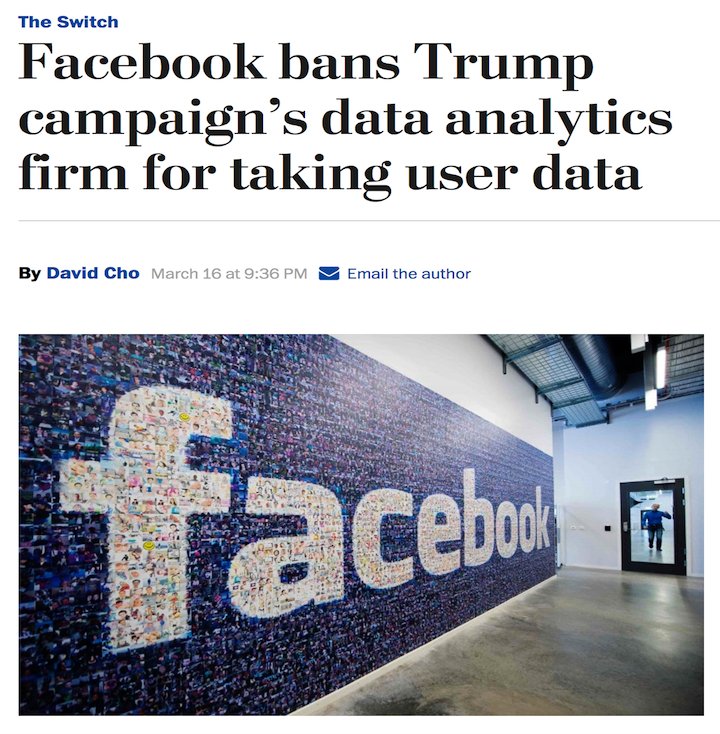
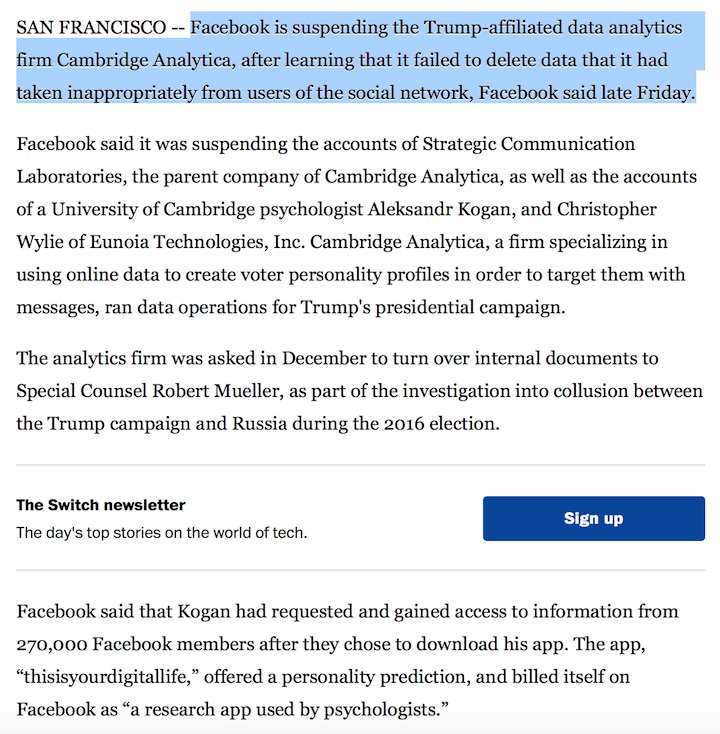
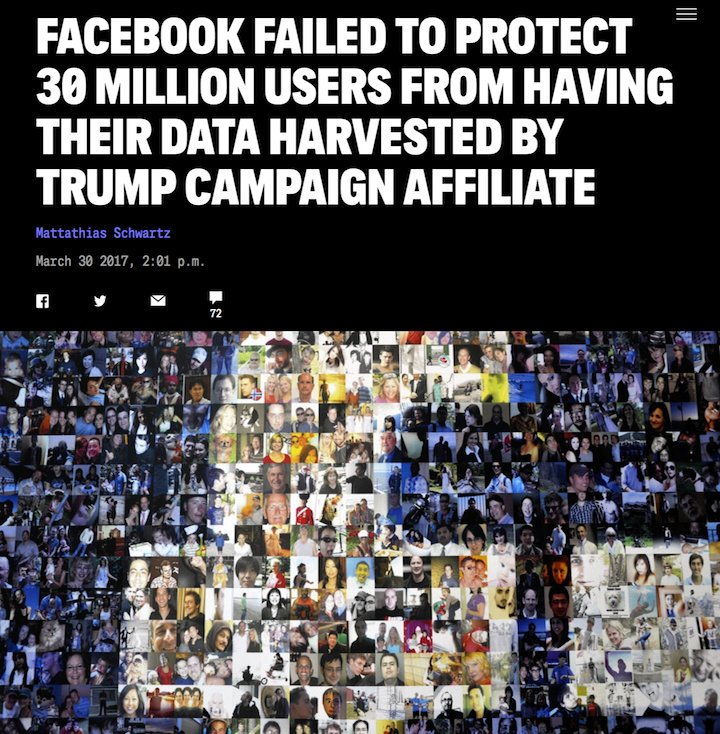
Very good, hard-hitting & non-credulous interview with the Cambridge Analytica whistleblower Chris Wylie. It's worth the 16 minutes it takes to watch.
Whistleblower reveals to Channel 4 News data grab of 50 million Facebook profiles by Cambridge Analytica – data firm linked to Trump win
Andy Davies
17 Mar 2018
Home Affairs Correspondent
The British data firm described as “pivotal” in Donald Trump’s presidential victory was behind a ‘data grab’ of more than 50 million Facebook profiles, a whistleblower has revealed to Channel 4 News. In part one of Channel 4 News’ ‘Data, Democracy and Dirty Tricks’ investigation, in an exclusive television interview, Chris Wylie, former Research Director at Cambridge Analytica tells all. In collaboration with the Observer newspaper.https://www.channel4.com/news/cambridge ... e-election
FACEBOOK FAILED TO PROTECT 30 MILLION USERS FROM HAVING THEIR DATA HARVESTED BY TRUMP CAMPAIGN AFFILIATE
Mattathias Schwartz
March 30 2017, 1:01 p.m.
LEIA EM PORTUGUÊS
IN 2014, TRACES of an unusual survey, connected to Facebook, began appearing on internet message boards. The boards were frequented by remote freelance workers who bid on “human intelligence tasks” in an online marketplace, called Mechanical Turk, controlled by Amazon. The “turkers,” as they’re known, tend to perform work that is rote and repetitive, like flagging pornographic images or digging through search engine results for email addresses. Most jobs pay between 1 and 15 cents. “Turking makes us our rent money and helps pay off debt,” one turker told The Intercept. Another turker has called the work “voluntary slave labor.”
The task posted by “Global Science Research” appeared ordinary, at least on the surface. The company offered turkers $1 or $2 to complete an online survey. But there were a couple of additional requirements as well. First, Global Science Research was only interested in American turkers. Second, the turkers had to download a Facebook app before they could collect payment. Global Science Research said the app would “download some information about you and your network … basic demographics and likes of categories, places, famous people, etc. from you and your friends.”
“Our terms of service clearly prohibit misuse,” said a spokesperson for Amazon Web Services, by email. “When we learned of this activity back in 2015, we suspended the requester for violating our terms of service.”
Although Facebook’s early growth was driven by closed, exclusive networks at college and universities, it has gradually herded users to agree to increasingly permissive terms of service. By 2014, anything a user’s friends could see was also potentially visible to the developers of any app that they chose to download. Some of the turkers noticed that the Global Science Research app appeared to be taking advantage of Facebook’s porousness. “Someone can learn everything about you by looking at hundreds of pics, messages, friends, and likes,” warned one, writing on a message board. “More than you realize.” Others were more blasé. “I don’t put any info on FB,” one wrote. “Not even my real name … it’s backwards that people put sooo much info on Facebook, and then complain when their privacy is violated.”
In late 2015, the turkers began reporting that the Global Science Research survey had abruptly shut down. The Guardian had published a report that exposed exactly who the turkers were working for. Their data was being collected by Aleksandr Kogan, a young lecturer at Cambridge University. Kogan founded Global Science Research in 2014, after the university’s psychology department refused to allow him to use its own pool of data for commercial purposes. The data collection that Kogan undertook independent of the university was done on behalf of a military contractor called Strategic Communication Laboratories, or SCL. The company’s election division claims to use “data-driven messaging” as part of “delivering electoral success.”
SCL has a growing U.S. spin-off, called Cambridge Analytica, which was paid millions of dollars by Donald Trump’s campaign. Much of the money came from committees funded by the hedge fund billionaire Robert Mercer, who reportedly has a large stake in Cambridge Analytica. For a time, one of Cambridge Analytica’s officers was Stephen K. Bannon, Trump’s senior adviser. Months after Bannon claimed to have severed ties with the company, checks from the Trump campaign for Cambridge Analytica’s services continued to show up at one of Bannon’s addresses in Los Angeles.
“You can say Mr. Mercer declined to comment,” said Jonathan Gasthalter, a spokesperson for Robert Mercer, by email.
FaceBook Elections signs stand in the media area at Quicken Loans Arena in Cleveland, Thursday, Aug. 6, 2015, before the first Republican presidential debate. (AP Photo/John Minchillo) Facebook Elections signs in the media area at Quicken Loans Arena in Cleveland, Aug. 6, 2015, before the first Republican presidential debate of the 2016 election. Photo: John Minchillo/AP
The Intercept interviewed five individuals familiar with Kogan’s work for SCL. All declined to be identified, citing concerns about an ongoing inquiry at Cambridge and fears of possible litigation. Two sources familiar with the SCL project told The Intercept that Kogan had arranged for more than 100,000 people to complete the Facebook survey and download an app. A third source with direct knowledge of the project said that Global Science Research obtained data from 185,000 survey participants as well as their Facebook friends. The source said that this group of 185,000 was recruited through a data company, not Mechanical Turk, and that it yielded 30 million usable profiles. No one in this larger group of 30 million knew that “likes” and demographic data from their Facebook profiles were being harvested by political operatives hired to influence American voters.
Kogan declined to comment. In late 2014, he gave a talk in Singapore in which he claimed to have “a sample of 50+ million individuals about whom we have the capacity to predict virtually any trait.” Global Science Research’s public filings for 2015 show the company holding 145,111 British pounds in its bank account. Kogan has since changed his name to Spectre. Writing online, he has said that he changed his name to Spectre after getting married. “My wife and I are both scientists and quite religious, and light is a strong symbol of both,” he explained.
The purpose of Kogan’s work was to develop an algorithm for the “national profiling capacity of American citizens” as part of SCL’s work on U.S. elections, according to an internal document signed by an SCL employee describing the research.
“We do not do any work with Facebook likes,” wrote Lindsey Platts, a spokesperson for Cambridge Analytica, in an email. The company currently “has no relationship with GSR,” Platts said.
“Cambridge Analytica does not comment on specific clients or projects,” she added when asked whether the company was involved with Global Science Research’s work in 2014 and 2015.
The Guardian, which was was the first to report on Cambridge Analytica’s work on U.S. elections, in late 2015, noted that the company drew on research “spanning tens of millions of Facebook users, harvested largely without their permission.” Kogan disputed this at the time, telling The Guardian that his turker surveys had collected no more than “a couple of thousand responses” for any one client. While it is unclear how many responses Global Science Research obtained through Mechanical Turk and how many it recruited through a data company, all five of the sources interviewed by The Intercept confirmed that Kogan’s work on behalf of SCL involved collecting data from survey participants’ networks of Facebook friends, individuals who had not themselves consented to give their data to Global Science Research and were not aware that they were the objects of Kogan’s study. In September 2016, Alexander Nix, Cambridge Analytica’s CEO, said that the company built a model based on “hundreds and hundreds of thousands of Americans” filling out personality surveys, generating a “model to predict the personality of every single adult in the United States of America.”
Shortly after The Guardian published its 2015 article, Facebook contacted Global Science Research and requested that it delete the data it had taken from Facebook users. Facebook’s policies give Facebook the right to delete data gathered by any app deemed to be “negatively impacting the Platform.” The company believes that Kogan and SCL complied with the request, which was made during the Republican primary, before Cambridge Analytica switched over from Ted Cruz’s campaign to Donald Trump’s. It remains unclear what was ultimately done with the Facebook data, or whether any models or algorithms derived from it wound up being used by the Trump campaign.
In public, Facebook continues to maintain that whatever happened during the run-up to the election was business as usual. “Our investigation to date has not uncovered anything that suggests wrongdoing,” a Facebook spokesperson told The Intercept.
Facebook appears not to have considered Global Science Research’s data collection to have been a serious ethical lapse. Joseph Chancellor, Kogan’s main collaborator on the SCL project and a former co-owner of Global Science Research, is now employed by Facebook Research. “The work that he did previously has no bearing on the work that he does at Facebook,” a Facebook spokesperson told The Intercept.
Chancellor declined to comment.
Cambridge Analytica has marketed itself as classifying voters using five personality traits known as OCEAN — Openness, Conscientiousness, Extroversion, Agreeableness, and Neuroticism — the same model used by University of Cambridge researchers for in-house, non-commercial research. The question of whether OCEAN made a difference in the presidential election remains unanswered. Some have argued that big data analytics is a magic bullet for drilling into the psychology of individual voters; others are more skeptical. The predictive power of Facebook likes is not in dispute. A 2013 study by three of Kogan’s former colleagues at the University of Cambridge showed that likes alone could predict race with 95 percent accuracy and political party with 85 percent accuracy. Less clear is their power as a tool for targeted persuasion; Cambridge Analytica has claimed that OCEAN scores can be used to drive voter and consumer behavior through “microtargeting,” meaning narrowly tailored messages. Nix has said that neurotic voters tend to be moved by “rational and fear-based” arguments, while introverted, agreeable voters are more susceptible to “tradition and habits and family and community.”
Dan Gillmor, director of the Knight Center at Arizona State University, said he was skeptical of the idea that the Trump campaign got a decisive edge from data analytics. But, he added, such techniques will likely become more effective in the future. “It’s reasonable to believe that sooner or later, we’re going to see widespread manipulation of people’s decision-making, including in elections, in ways that are more widespread and granular, but even less detectable than today,” he wrote in an email.
Trump’s circle has been open about its use of Facebook to influence the vote. Joel Pollak, an editor at Breitbart, writes in his campaign memoir about Trump’s “armies of Facebook ‘friends,’ … bypassing the gatekeepers in the traditional media.” Roger Stone, a longtime Trump adviser, has written in his own campaign memoir about “geo-targeting” cities to deliver a debunked claim that Bill Clinton had fathered a child out of wedlock, and narrowing down the audience “based on preferences in music, age range, black culture, and other urban interests.”
Clinton, of course, had her own analytics effort, and digital market research is a normal part of any political campaign. But the quantity of data compiled on individuals during the run-up to the election is striking. Alexander Nix, head of Cambridge Analytica, has claimed to “have a massive database of 4-5,000 data points on every adult in America.” Immediately after the election, the company tried to take credit for the win, claiming that its data helped the Trump campaign set the candidate’s travel schedule and place online ads that were viewed 1.5 billion times. Since then, the company has been de-emphasizing its reliance on psychological profiling.
The Information Commissioner’s Office, an official privacy watchdog within the British government, is now looking into whether Cambridge Analytica and similar companies might pose a risk to voters’ rights. The British inquiry was triggered by reports in The Observer of ties between Robert Mercer, Cambridge Analytica, and the Leave.EU campaign, which worked to persuade British voters to leave the European Union. While Nix has previously talked about the firm’s work for Leave.EU, Cambridge Analytica now denies that it had any paid role in the campaign.
Twickenham, members of Leave EU and UKIP hand out leaflets<br /><br /><br /><br /> Grassroots Out action day on EU membership, London, Britain - 05 Mar 2016</p><br /><br /><br /> <p> (Rex Features via AP Images) Leave.EU signage is displayed in London on March 5, 2016. Photo: Rex Features/AP Images
In the U.S., where privacy laws are looser, there is no investigation. Cambridge Analytica is said to be pitching its products to several federal agencies, including the Joint Chiefs of Staff. SCL, its parent company, has new offices near the White House and has reportedly been advised by Gen. Michael Flynn, Trump’s former national security adviser, on how to increase its federal business. (A spokesperson for Flynn denied that he had done any work for SCL.)
Years before the arrival of Kogan’s turkers, Facebook founder Mark Zuckerberg tried to address privacy concerns around the company’s controversial Beacon program, which quietly funneled data from outside websites into Facebook, often without Facebook users being aware of the process. Reflecting on Beacon, Zuckerberg attributed part of Facebook’s success to giving “people control over what and how they share information.” He said that he regretted making Beacon an “opt-out system instead of opt-in … if someone forgot to decline to share something, Beacon went ahead and still shared it with their friends.”
Seven years later, Facebook appears to have made the same mistake, but with far greater consequences. In mid-2014, however, Facebook announced a new review process, where the company would make sure that new apps asked only for data they would actually use. “People want more control,” the company said at that time. “It’s going to make a huge difference with building trust with your app’s audience.” Existing apps were given a full year to switch over to have Facebook review how they handled user data. By that time, Global Science Research already had what it needed.
https://theintercept.com/2017/03/30/fac ... affiliate/
Massachusetts launches probe into Cambridge Analytica’s use of Facebook data
BY LUIS SANCHEZ - 03/17/18 02:19 PM EDT 47
Massachusetts launches probe into Cambridge Analytica’s use of Facebook data
© Getty Images
Massachusetts attorney general Maura Healey (D) announced Saturday that her state will launch an investigation into Cambridge Analytica, a data firm used by the Trump campaign during the 2016 election, after Facebook suspended the firm.
"Massachusetts residents deserve answers immediately from Facebook and Cambridge Analytica. We are launching an investigation," Healey tweeted.
Cambridge Analytica was suspended on Friday after reports that it had not fully deleted data it obtained from Cambridge University professor Aleksandr Kogan.
The professor was found to have harvested more than 50 million Facebook profiles from his app, which required a Facebook login, despite only 270,000 having given permission for their data to be harvested, according to a New York Times report Saturday.
About thirty million of the profiles Kogan gave the firm had enough information to create psychographic profiles, the newspaper reported.
Facebook said discovered that the firm had violated its rules in 2015 and demanded that the firm certify it had destroyed the data it had received. The firm provided the certification.
However, Facebook said it suspended the firm after recent reports came out that said Cambridge Analytica did not destroy all of its data.
“If true, this is another unacceptable violation of trust and the commitments they made. We are suspending SCL/Cambridge Analytica, Wylie and Kogan from Facebook, pending further information,” Facebook Vice President Paul Grewal said in a statement issued Friday.
“Although Kogan gained access to this information in a legitimate way and through the proper channels that governed all developers on Facebook at that time, he did not subsequently abide by our rules. By passing information on to a third party, including SCL/Cambridge Analytica and Christopher Wylie of Eunoia Technologies, he violated our platform policies,” the statement read.
Cambridge Analytica has come under scrutiny for its involvement in the 2016 presidential election. President Trump’s former strategist and chief campaign executive Steve Bannon was a former vice president of the firm.
Special counsel Robert Mueller has reportedly requested all the emails between the firm and the Trump campaign and the firm’s CEO has been reportedly interviewed by the House Intelligence Committee.
http://thehill.com/policy/technology/37 ... ssion=true
Oh, and there's this: SCL Analytics, the parent company of Cambridge Analytica, was hired to "wage a global social media campaign urging a boycott of Qatar."
The same boycott that Jared Kushner reportedly backed.
https://www.politico.com/tipsheets/poli ... ion-222775 …
Oct. 2017: "SCL Analytics, the parent company of Cambridge Analytica, registered with the Justice Department as a foreign agent working on behalf of the National Media Council of the United Arab Emirates."
11/
https://www.politico.com/tipsheets/poli ... ion-222775 …
Dec '17: "Trump admin is considering a proposal by Blackwater founder Erik Prince, a retired CIA officer, & Oliver North (Iran-Contra scandal) to provide CIA Dir Pompeo & the WH w/ a global, private spy network that would circumvent US intel agencies"
12/
TRUMP WHITE HOUSE WEIGHING PLANS FOR PRIVATE SPIES TO COUNTER “DEEP STATE” ENEMIES
https://theintercept.com/2017/12/04/tru ... e-enemies/
Oh look who else was interested in private security and intelligence operations: George Nader and his friend/business associate Elliott Broidy.
Imagine that.
13/
https://twitter.com/RVAwonk/status/970129292456755200
The Long History of Computer Science and Psychology Comes Into View
Understanding that legacy can help us stop the next Cambridge Analytica.
By LUKE STARK
MARCH 18, 20184:14 PM
For decades, computer scientists interested in human-computer interaction have viewed the brain as a machine.
Future Tense
Future Tense is a partnership of Slate, New America, and Arizona State University that examines emerging technologies, public policy, and society.
The truth is finally out about Cambridge Analytic. In a series of eye-popping articles for the Guardian, Carole Cadwalladr and her colleagues have detailed the full story of how research linking Facebook demographic data to personality traits apparently ended up in the hands of Steve Bannon, Robert Mercer, and the Donald Trump campaign.
I’ve been staggered by the sheer detail of these articles, but totally unsurprised by their content: I’ve been arguing for years that the integration of digital media devices and psychological techniques is one of the most underappreciated developments in the history of computing. For more than 50 years, this has been the domain of computer scientists who have approached the brain as a “human processor,” just another a machine to be tinkered with. The work has taken place almost entirely in the domain of computer science, with little input from clinical psychologists, ethicists, or other academic fields interested in the messy details of human social life. Understanding that shortsighted perspective, and how it gave rise to companies like Cambridge Analytica, can help us curtail the weaponziation of social media today.
Psychological models shaped the development of computers from the very beginning. Kurt Lewin, one of the founders of social psychology, was a participant in the 1946 Macy Conference, a now-legendary gathering of computer scientists and scholars interested in human behavior that helped birth both cybernetics and systems theory. This combination of psychology, systems analysis, and computer science became a hallmark of other Cold-War era research institutes like the RAND Corp. and the Stanford Research Institute. Much of this research was tied to the defense establishment and their large institutional mainframes. The idea of an individual user interacting at their own discretion with newly personal computers attracted only a few visionary designers like Douglas Engelbart, the inventor of the computer mouse.
Psychology’s insights into the complexities of the human mind both troubled and fascinated computer scientists in the 1950s and 1960s. In 1966 AI pioneer Joseph Weizenbaum modeled ELIZA, one of the first chat bots, after famed talk therapist Carl Rogers. Weizenbaum set out to demonstrate how superficial communications between humans and machines were at the time, and was surprised when scores of people ascribed the program with intelligence. Also in the 1960s, computer scientist Hilary Putnam developed the idea of the “computational theory of mind,” which understood the brain as a computing machine and helped shape the field of cognitive psychology around thinking of brains as “information processors.”
It was this development—metaphorically understanding brains as computers—that really began to knit psychology and computer science together in the field of human-computer interaction. A critical moment came with the 1983 publication of The Psychology of Human Computer Interaction by three scientists working for the Xerox Corp.’s Palo Alto Research Center—Stuart K. Card, Thomas P. Moran, and Allen Newell. Together, they made up the Applied Information-Processing Psychology Project at PARC, which had an outsized impact on a wide range of developments in personal computing between the 1970s and 1990s. The three brought a wealth of experience: Card was a psychologist by training, Moran a human factors engineer, and Newell a mathematician, game theorist, and artificial intelligence researcher. Card had been developing ways to apply cognitive psychology to human-computer interaction since his arrival at PARC; in the spring of 1980, he and Moran ran a graduate seminar at Stanford’s Computer Science department on the subject, open to both engineers and psychologists.
The kind of communication with machines envisioned by the PARC authors was based on understanding the human being as a functional analogue to the computer. The goal of the authors was to “integrate all the units of the human processor to do useful tasks.” These tasks could be processed through the collection of human data: about physiological response rates, movement dynamics, and other processes amenable to the digital languages of computing. The authors illustrated their idea of the “model human processor” with a bald, smiling homunculus staring happily at a computer screen.
Card and his co-authors had great ambitions for human-computer interaction as a new way to shape our behavior. They called it “an applied psychology” grounded in understanding a human and computer as one single unit through numerical tracking, task analysis, and calculability. In traditional experimental psychology, the authors complained, “measurements come to have little value in themselves as a continually growing body of useful quantitative knowledge.” Human-computer interaction, in contrast, would collect data about the human body indiscriminately, and put all sorts of measurement about the human information processor to use.
Card, Moran, and Newell were interested in collecting whatever data they could about human computer users—and they thought that computer scientists, not psychologists, should be the ones applying psychological techniques with digital systems. Systems designers were “engaged in a sort of psychological civil engineering,” they wrote, using human abilities as one factor among many to create an efficiently operating system.
The Psychology of Human Computer Interaction was highly influential. Crucially, it pushed studies of how humans interact with computers firmly into computer science for almost 20 years, detaching psychological techniques from their human context and prompting psychologists themselves to play catch-up. Branches of psychology already dealing with evaluations by number, like psychometricians, found human-computer interaction research especially amenable to their experiments. For instance, British data scientist and psychologist Michal Kosinski claimed in a 2013 paper that publicly available Facebook likes could be used to determine a user’s race, sex, sexuality, and even personality traits. Last year, Kosinski published a paper suggesting that his AI system could determine the sexual orientation of faces more accurately than a human being.
Happily, human-computer interaction has changed over the past decade to include a more diverse set of methods and disciplines, including insights from designers, historians, anthropologists, and sociologists. Unfortunately, social media platforms were already up and running under the auspices of computer science as “psychological civil engineering,” via digital means without much input from the social sciences. The humble online quiz, a way for individuals to while away time ever since Spark.com’s famous Purity Test from the 1990s became a vector to collect personality data. Kosinski’s 2013 researcher relied on a personality test circulated via Facebook—a copy of which was used by Cambridge Analytica. And with Facebook and Twitter performing nearly constant behavioral experiments to test ways their users could be nudged into spending more time on their sites, the amounts of behavioral and psychological data collected by our digital devices is only getting bigger. “A smart phone,” Kosinski told the media after the 2016 election, “is a vast psychological questionnaire that we are constantly filling out, both consciously and unconsciously.”
As the Cambridge Analytica story shows, there’s a fine line between psychological civil engineering and psychological civil war. The behavioral, demographic, and personal information Facebook and other social media platforms now collect through what I call algorithmic psychometrics has the sensitivity of medical data, and should be treated as such by regulators around the world. In the United States, the Health Insurance Portability and Accountability Act protects medical and other health information—but only if that information is collected and used by organizations like health care providers and insurance plans. Instead, regulators need to rethink health privacy laws by focusing on both how demographic, behavioral, and psychological data is collected and used across all sectors of the digital economy. The long history of psychology’s role in computing means the Cambridge Analytica bombshell makes unfortunate sense—and makes immediate regulation of these forms of data an urgent necessity.






